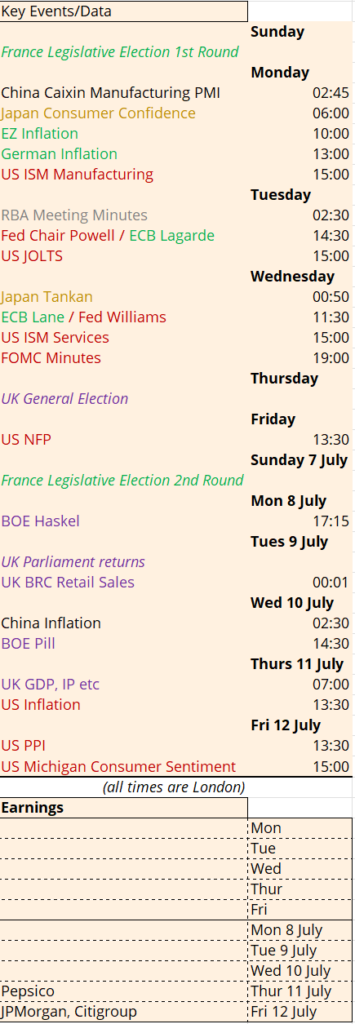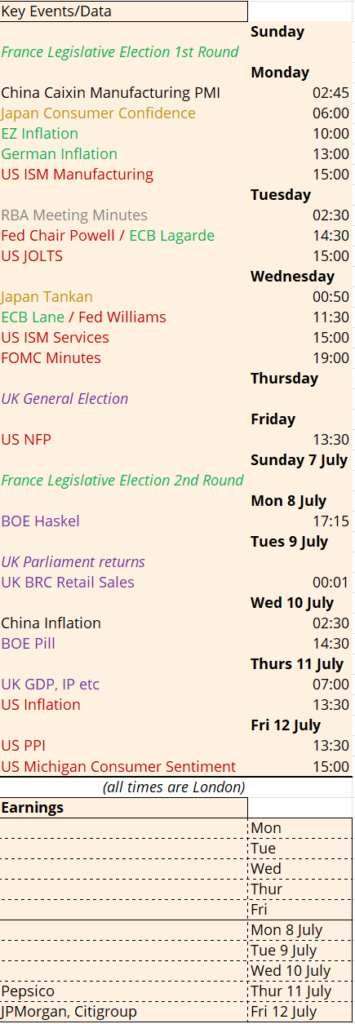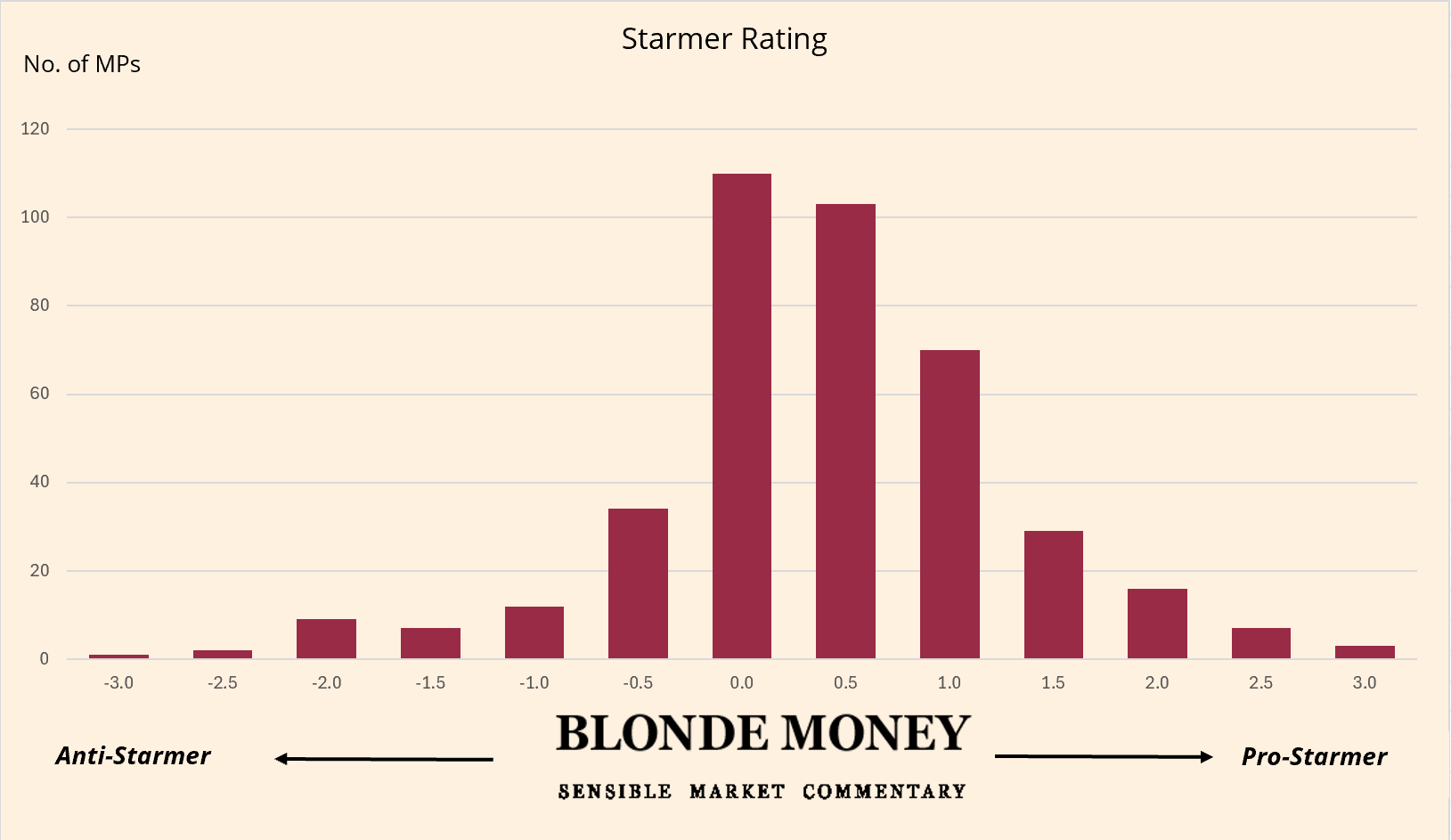
The Big Election Two Weeks That Will Be

1. The UK
We all know that Sir Keir Starmer will become the UK Prime Minister in the wake of the General Election on Thursday. We also know that he will have a decent majority, or even a massive one. That means we also know who the opposition will be: the Labour Party. Or rather, certain factions within it. Not the Corbynistas who have been purged but other, larger, groups with axes to grind, projects to champion and impatience to get on with them. For example, those passionate about the climate crisis will not feel able to waste 14 seconds let alone another 14 years now that they’ve got an unassailable majority with which to take action. And they can’t be assuaged by sinecures when there will be so few meaty jobs to go round.
This won’t cause a problem initially. Keir is going to look like a legend. Power begets power. Forelock-tuggers will be lining up to genuflect at the man named after the founder of the Labour Party, bathing in the reflective glory of an historic victory. With Sue Gray having prepped the party for power, Team Starmer will want to hit the ground running. Parliament returns for the election of the Speaker on Tuesday 9th July and then the legislative agenda will be set out in full with the King’s Speech on Wednesday 17th July. Starmer will have immediate opportunities to be the international statesman with the NATO Summit on 9th July in Washington DC and then the UK is hosting the European Political Community Summit of 47 countries at Blenheim Palace, ancestral home of Churchill, on Thursday 18th July. Sunak couldn’t have teed the timing up more nicely for him.
And what of Rishi Sunak or indeed the Conservative Party? If the Liberal Democrats benefit from tactical voting and enough disgruntled Blue Wall voters then it’s not beyond the realms of possibility that they gain enough seats to leapfrog the Tories into the spot of The Official Opposition. Even if the Conservatives perform to the upper end of expectations it will still be a disastrous plummet from the heady heights of the last election when Boris (and it will be referred to by his name personally) delivered the largest Tory majority in 32 years. The only thing more ex than an ex MP is an ex Party. The Tories will not just be impotent but, fatally, irrelevant. This will leave the master of the airwaves, Nigel Farage, to sweep up the right wing media vacuum.
2. The US
He has learnt a lot from his mentor Donald Trump who has always managed to set the agenda, even, or perhaps especially, when he doesn’t have a grasp of the facts. The Donald doesn’t even need to say very much after Biden’s disastrous debate performance. The Democrats are merrily destroying themselves without any intervention from the GOP. The New York Times has called for Joe to leave the race.
Unfortunately for the Democrats any path forward is a step back.
- Changing the candidate now suggests the current President isn’t able to discharge his duties, meaning Biden would have to step down. It’s hard to argue someone can continue for 6 months but not 4 years and 6 months; it’s even harder to argue that they should have been elected in the first place – or persisted for almost four years – if their health and cognitive function were in such doubt.
- That would bring forward Kamala Harris to step up from Veep to President, despite the fact she is even more disliked than Biden and unlikely to appeal to swing voters;
- She would then be the presumptive presidential candidate; how can she be President for 6 months but then forced to step aside to make way for someone else?
This is why former Presidents like Obama and Clinton have been so vocal in their unwavering support for Biden. Any hint of weakness and the leadership of the free world falls into chaos – and does so now, let alone after November 5th.
It’s not as if there is a clear alternative anyway. If the Democrats thought they had better candidates, they would have put them forward four years ago. They couldn’t agree then and they will struggle to agree now. If Biden were somehow to step aside before the Democratic National Convention which runs from 19th to 22nd August, it would generate a brokered convention to decide on the candidate whereby horse trading, bullying and pork barrel bribery would be required for one name to command a majority of the ~4,000 delegates. The inevitable compromise candidate would then emerge from the brutal and bloody battle between the factions of the Democratic Party with only two and a half months to make their case on the national stage. With momentum key to victory in any election this would be a tall order, not least when the opposition candidate has been campaigning relentlessly for over eight years.
The Democrats are in disarray thanks to decisions they took four years ago. They thought they had beaten Trump into submission; that America couldn’t go back to the path favoured by the deplorables. They thought job growth, moderating inflation, leadership against Putin and fear of a conservative Supreme Court must – simply must – keep them in the White House. A change now would be an admission of defeat. Not changing now almost guarantees defeat.
Whatever happens, a Trump victory has become almost inevitable.
3. France
We can also be sure that France is entering a tumultuous period, whatever the ultimate result of the legislative elections. Exit polls from the first round showed Le Pen’s Rassemblement National as the clear front runners, almost doubling their share of the vote from the last election two years ago. Turnout was the highest in forty years. The left-wing parties and the Republicans achieved similar vote shares whilst Macron’s centrist alliance dropped by one fifth:

The second round takes place on Sunday 7th July and estimates suggest Le Pen’s alliance could take anything from 240 to 310 seats. The winning threshold for a majority in parliament is 289 so the base case is that the RN’s Jordan Bardella becomes Prime Minister in just over a week’s time.
Whether he has a formal majority or the RN are the largest party depends on tactical voting in the final round. There are an unusually high number of seats where there will be three options on the ballot paper rather than the typical two – as many as 315 seats according to Ipsos. Melenchon of the far left has already said he will withdraw their candidate where they have come in third place, but he doesn’t speak for all of the “New Popular Front” left wing alliance. The Republicans have issued a statement saying they will maintain all their candidates. Members of Macron’s camp have given contradictory instructions whilst his party’s official statement is that the RN must be beaten ‘by choosing candidates who clearly and without ambiguity defend the Republic’s values’.
All of this is rather grist to Le Pen’s mill. One third of the electorate back her agenda and the only response of the ruling elite is to say that voters must team up to stop them. Former President Hollande, who came first in his constituency, lamented “who else but us… can embody the defence of the Republic?“.
This should ring alarm bells. The very raison d’etre of the RN is to foment revolution against the ruling elites. The war has already begun. This is a big problem for the EU, whatever the exact constellation of seats following the second round. The RN is spoiling for a fight. Markets are relaxed about this, apparently only fearful of the far left’s economic agenda. Perhaps they are taken in when Bardella says ‘I do not intend to go to war with Brussels‘ without spotting that in the next breath he says ‘I just want France to defend its interests‘. In the same interview with the FT he declared ‘I want to get a rebate‘, claiming he can use the ‘weight’ of his political victory to reduce France’s contributions to the EU Budget. This style is very much like someone saying, I don’t mean to offend you…. just before unleashing great offence. No doubt he will be delighted to swallow being placed under the EU’s Excessive Deficit Procedure. Perhaps that’s why he has pledged to cut VAT on energy as the “purchasing power prime minister” even though this would contravene EU rules. He also wants domestic subsidies along with a host of other policies that would go against core tenets of EU membership. Even without a numerical majority he might find common cause with those in other parties – the line from left to right is more of a circle which joins up when others can see value in sharing policies.
Standing up to Brussels might encourager les autres, in particular Meloni who has now been snubbed by the centrist legacy blocs in their stitch up of the top EU roles. She has issued her own warning, that von der Leyen has only a “fragile majority” for a second term and that all the nominees for EU positions were “destined to have difficulties in the European legislature“. The vote on the nominees is a secret ballot and as such is not yet a done deal. It indicates that attempts by Brussels to continue with business as usual after the increase in support for the far right will only end in tears.
All of this challenges the very fabric of the EU. Nobody is quite sure whether the ECB would intervene if – or as we expect, when – the French bond market comes under pressure once more. German Finance Minister Christian Lindner has said he hoped the ECB would not have to take action, adding that this would raise “economic and…constitutional questions”.
These questions cannot be avoided. It is only by raising them and then answering them that the European project can survive. But we have to go through the chaos first.
4. Central Banks
The central bankers will get to chew the cud over all the political change at the annual ECB Forum on Central Banking at Sintra in Portugal from July 1st to 3rd. On Tuesday 2nd July the big beasts come together with Powell and Lagarde speaking on the enigmatically entitled ‘Policy Panel’. On Wednesday 3rd July the ECB’s Lane will chair a panel featuring the NY Fed’s John Williams on ‘Drivers of Equilibrium Interest Rates’.
This will be an ideal opportunity for all of them to signal that even if (or in the ECB’s case when) interest rates fall, they’re merely adjusting from their new, higher, steady state and not heading significantly lower.



